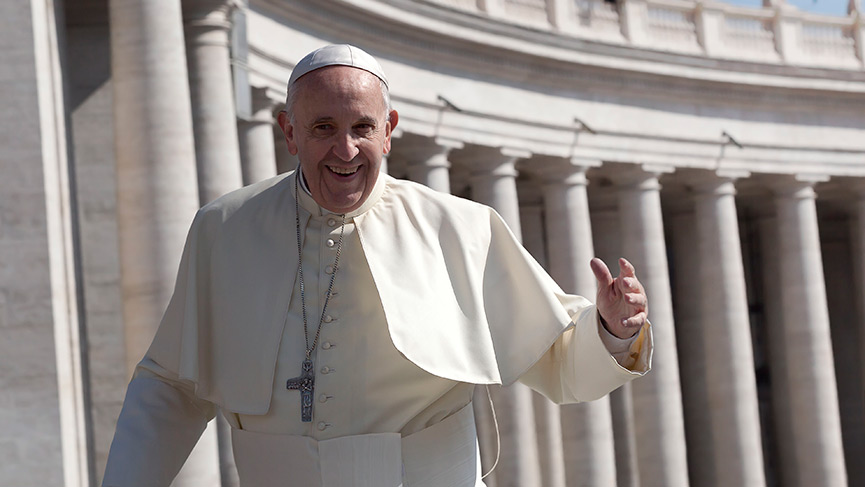Pope at Angelus: God loves us in all our frailty

Pope Francis
Pope Francis reflects on how by making himself flesh, God united himself to humanity, loving us in all our frailty and inviting us to share everything with Him.
From Vatican News
Pope Francis on Sunday invited the faithful to invite God into their homes, their families, to share with Him their frailties and fears in order to allow Him to change their lives.
Speaking during the Angelus on the second Sunday after Christmas, the Pope contemplated the tenderness of the Child Jesus in the crib, and reflected on the Gospel of John (Jn 1:1) explaining that, especially in the prologue, “it tells us about Him before He was born.”
He said that the apostle uses similar words to those used in the Bible with the account of Creation, but says that today “the One we contemplated at His Birth, existed before: before things began, before the universe. He existed before space and time. “In Him was life” (Jn 1:4), before life appeared.”
God communicates with us
The Pope noted that “Saint John calls Him the Logos, that is, the Word.” And the word, he added, serves to communicate: “one does not speak alone, one speaks with someone.”
The fact that Jesus was, from the very beginning, the Word, Pope Francis continued, “means that from the beginning God wants to communicate with us, He wants to talk to us.”
The Son of the Father, Pope Francis explained, “wants to tell us about the beauty of being children of God,” he wants to remove the darkness of evil from us: “He is 'the life' who knows our lives and wants to tell us that He has always loved them.”
“Jesus is the eternal Word of God, who has always thought of us and wanted to communicate with us,” he said.
He became flesh to dwell for ever amongst us
The Pope explained that thus, as today’s Gospel tells us, Jesus went beyond words, and indeed, “the Word became flesh and dwelt among us.”
He reflected on Saint John’s choice of the word flesh, that indicates our human condition in all its weakness, in all its frailty.
“He tells us that God became fragile so He could touch our fragility up close,” he said.
"Revealing the wounds of His flesh to the Father," the Pope said, "Jesus intercedes for us."
From the moment the Lord took on flesh, Pope Francis explained, nothing of our life is extraneous to Him: “There is nothing that He scorns, we can share everything with Him.”
“Dear brother, dear sister, God became flesh to tell you that He loves you like that, in your frailty; right there, where you are most ashamed,” he said.
The Pope went on to detail how God did not turn back, “He did not put our humanity on like a garment that can be put on and taken off,” He never again detached Himself from our flesh. And He will never be separated from it.
He explained that, as the Gospel says, “He came to dwell among us. He did not come to visit us.”
Open your hearts to the Lord
“What, then, does He desire from us?” the Pope asked: “A great intimacy!”
He wants us to share with Him our joys and sufferings, he said, our desires and fears, hopes and sorrows, people and situations.
The Pope concluded exhorting the faithful to do just this, to open their hearts to Him and to tell Him everything.
“Let us pause in silence before the crib to savour the tenderness of God who became near, who became flesh. And without fear, let us invite Him among us, into our homes, into our families, into our frailties. He will come and life will change.”
Pope Francis' special greetings for the New Year
Following the Angelus prayer Pope Francis renewed his good wishes for the year that has just begun to all. He said that as Christians, we know that things will only improve, with God’s help, if we work together for the common good, “putting the weakest and most disadvantaged at the center.”
“We do not know what 2021 will bring, but what each of us and all of us together can do, is to commit to taking care of each other and of creation, our common home,” he said.
He revealed that he was saddened to read in the newspapers there have been instances in the past days in which some people chose to ignore lockdown rules in order to “have a good vacation,” without a thought for others who are suffering the consequences of the pandemic.
The Pope expressed his special greetings in particular to those “who begin the New Year with greater difficulties: the sick, the unemployed, those who live in situations of oppression or exploitation.”
He also said he is close to those families who are expecting the arrival of a new baby, saying: “A birth is always a promise of hope!”

Comment
Comment
Add new comment